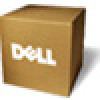Dell Broadcom NetXtreme Family of Adapters Broadcom NetXtreme 57XX User Guide - Page 53
Exit and Save Configuration
 |
View all Dell Broadcom NetXtreme Family of Adapters manuals
Add to My Manuals
Save this manual to your list of manuals |
Page 53 highlights
9. From the 1st Target Parameters screen, enable Connect to connect to the iSCSI target. Type values for the following using the values used when configuring the iSCSI target: IP Address TCP Port Boot LUN iSCSI Name 10. Select ESC to return to the Main menu. 11. A second iSCSI boot adapter can be configured for redundancy in the event the primary adapter fails to boot. To configure the secondary device parameters, select Secondary Device Parameters from the Main menu (see Configure Parameters for a Secondary Adapter). Otherwise, go to step 12. 12. Select ESC and select Exit and Save Configuration. 13. Select F4 to save your MBA configuration. Dynamic iSCSI Boot Configuration In a dynamic configuration, you only need to specify that the system's IP address and target/initiator information are provided by a DHCP server (see IPv4 and IPv6 configurations in Configuring the DHCP Server to Support iSCSI Boot). For IPv4, with the exception of the initiator iSCSI name, any settings on the Initiator Parameters, 1st Target Parameters, or 2nd Target Parameters screens are ignored and do not need to be cleared. For IPv6, with the exception of the CHAP ID and Secret, any settings on the Initiator Parameters, 1st Target Parameters, or 2nd Target Parameters screens are ignored and do not need to be cleared. For information on configuration options, see Table 1. NOTE: When using a DHCP server, the DNS server entries are overwritten by the values provided by the DHCP server. This occurs even if the locally provided values are valid and the DHCP server provides no DNS server information. When the DHCP server provides no DNS server information, both the primary and secondary DNS server values are set to 0.0.0.0. When the Windows OS takes over, the Microsoft iSCSI initiator retrieves the iSCSI Initiator parameters and configures the appropriate registries statically. It will overwrite whatever is configured. Since the DHCP daemon runs in the Windows environment as a user process, all TCP/IP parameters have to be statically configured before the stack comes up in the iSCSI Boot environment. If DHCP Option 17 is used, the target information is provided by the DHCP server, and the initiator iSCSI name is retrieved from the value programmed from the Initiator Parameters screen. If no value was selected, then the controller defaults to the name: iqn.1995-05.com.broadcom..iscsiboot where the string 11.22.33.44.55.66 corresponds to the controller's MAC address. If DHCP option 43 (IPv4 only) is used, then any settings on the Initiator Parameters, 1st Target Parameters, or 2nd Target Parameters screens are ignored and do not need to be cleared. To configure the iSCSI boot parameters using dynamic configuration 1. From the MBA Configuration Menu, select CTRL+K. 2. From the Main menu, select General Parameters. 3. From the General Parameters screen, set the following: TCP/IP parameters via DHCP: Enabled. (For IPv4.) IP Autoconfiguration: Enabled. (For IPv6, non-offload.) iSCSI parameters via DHCP: Enabled CHAP Authentication: Disabled Boot to iSCSI target: Disabled DHCP Vendor ID: BRCM ISAN Link Up Delay Time: 0 Use TCP Timestamp: Enabled (for some targets such as the Dell/EMC AX100i, it is necessary to enable Use TCP Timestamp) Target as First HDD: Disabled LUN Busy Retry Count: 0















